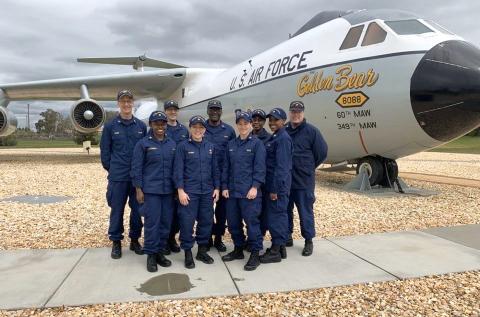NIH’s Kastner Comes to Aid of Cruise Ship Passengers

On Mar. 11, Lcdr. Tameika Kastner of ORS’s Division of Occupational Health and Safety (DOHS) received a phone call: she was to deploy for the Public Health Service’s response to support passengers who had returned to the United States on the Grand Princess cruise ship.
Three days earlier, the ship docked in Oakland, Calif., because of an on-board COVID-19 outbreak. Nearly 3,000 passengers disembarked and quarantined for 14 days at military bases across the country. Roughly 800 were sent to Travis Air Force base, a military base east of Oakland, for 2 weeks.
“When I got called into deployment, it was unexpected,” she said. “I got the call at 10:30 at night, saying ‘You’re going to get deployed tomorrow afternoon.’”
She was part of a swab team, helping to test passengers with possible COVID-19 infections. Over the next 2 weeks, she was part of an effort that collected samples from almost 470 passengers.
When she first arrived, public health officials trained her in procedures for donning and doffing protective personnel equipment and how to collect and prepare samples. Kastner worked with two other PHS officers to first ask passengers whether they wanted to be tested or not.
“A clinician collected the sample from a guest, a second person took the tube and bagged it properly and a third person provided new personal protective equipment for the person who collected the sample,” she said.
At NIH, Kastner is food safety and drinking water program manager for DOHS.
The deployment to Travis Air Force base was her second PHS assignment. In 2017, she was one of 500 officers sent to help in response to Hurricane Harvey in Houston.
Kastner’s first deployment was “a little stressful because we were bouncing all over the place. We slept in nine different locations.” Then Hurricane Irma made landfall in Florida. She helped in that disaster response, as well. Her recent deployment went much smoother and wasn’t as stressful. She stayed in one location.
“What’s crazy is that schools closed the same day I was deployed,” she said. “My husband still had to physically go into work.” Fortunately, her parents offered to watch her kids for 2 weeks.
Once she came back, she adjusted to a new life. Like so many other NIH’ers, she began teleworking full-time while homeschooling her children. There were, for example, no swim lessons, dance classes or math tutoring.
“The COVID-19 outbreak did not just hit the ship,” Kastner said. “The whole country was impacted.”
